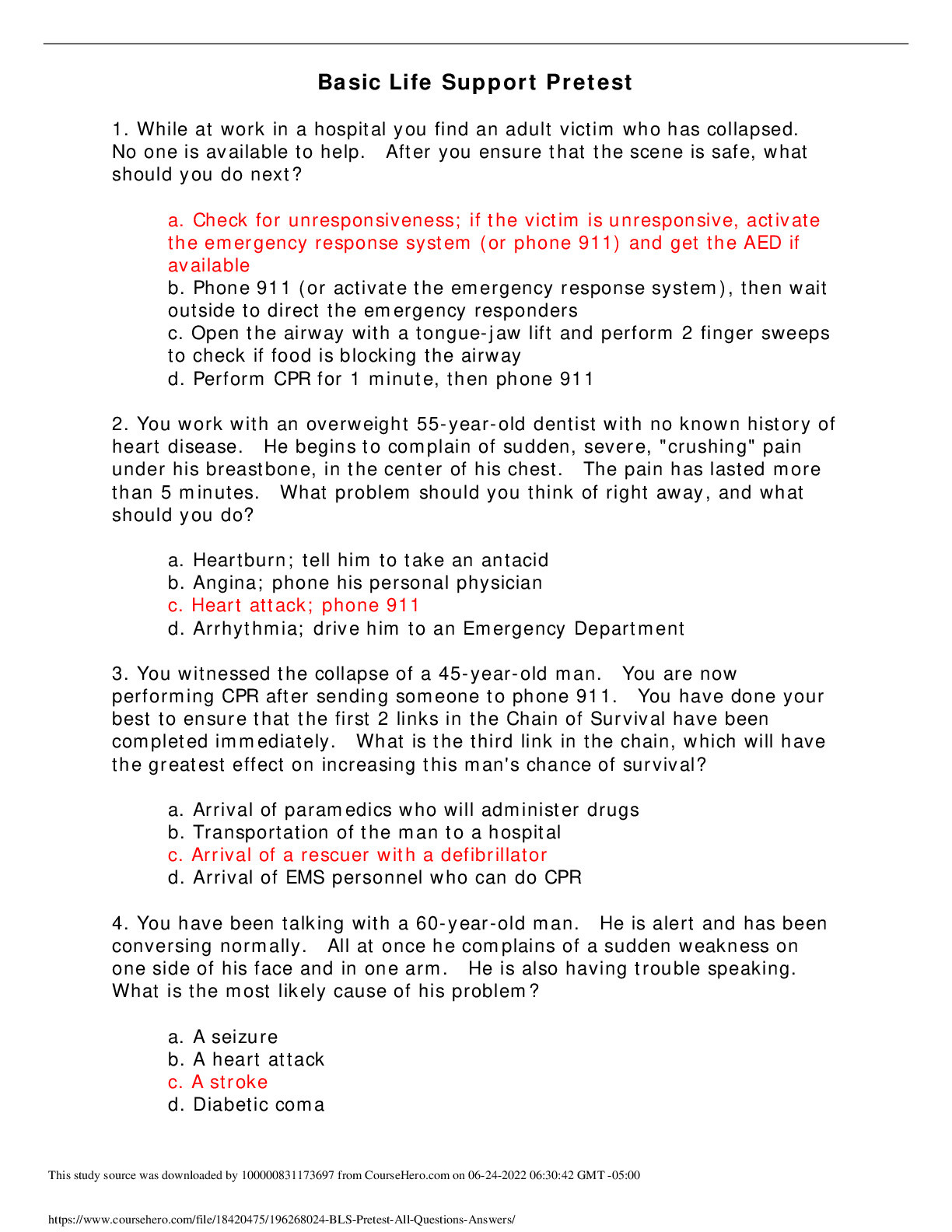All study resources > 196268024-BLS-Pretest-All-Questions-Answers (Nursing)
196268024-BLS-Pretest-All-Questions-Answers
1. While at work in a hospital you find an adult victim who has collapsed.
No one is available to help. After you ensure that the scene is safe, what
should you do next?
a. Check for unresponsiveness; if the victim is unresponsive, activate
the emergency response system (or phone 911) and get the AED if
available
b. Phone 911 (or activate the emergency response system), then wait
outside to
...[Show More]
1. While at work in a hospital you find an adult victim who has collapsed.
No one is available to help. After you ensure that the scene is safe, what
should you do next?
a. Check for unresponsiveness; if the victim is unresponsive, activate
the emergency response system (or phone 911) and get the AED if
available
b. Phone 911 (or activate the emergency response system), then wait
outside to direct the emergency responders
c. Open the airway with a tongue-jaw lift and perform 2 finger sweeps
to check if food is blocking the airway
d. Perform CPR for 1 minute, then phone 911
2. You work with an overweight 55-year-old dentist with no known history of
heart disease. He begins to complain of sudden, severe, "crushing" pain
under his breastbone, in the center of his chest. The pain has lasted more
than 5 minutes. What problem should you think of right away, and what
should you do?
a. Heartburn; tell him to take an antacid
b. Angina; phone his personal physician
c. Heart attack; phone 911
d. Arrhythmia; drive him to an Emergency Department
3. You witnessed the collapse of a 45-year-old man. You are now
performing CPR after sending someone to phone 911. You have done your
best to ensure that the first 2 links in the Chain of Survival have been
completed immediately. What is the third link in the chain, which will have
the greatest effect on increasing this man's chance of survival?
a. Arrival of paramedics who will administer drugs
b. Transportation of the man to a hospital
c. Arrival of a rescuer with a defibrillator
d. Arrival of EMS personnel who can do CPR
4. You have been talking with a 60-year-old man. He is alert and has been
conversing normally. All at once he complains of a sudden weakness on
one side of his face and in one arm. He is also having trouble speaking.
What is the most likely cause of his problem?
a. A seizure
b. A heart attack
c. A stroke
d. Diabetic coma
5. You remove a 3-year-old from the bottom of the shallow end of a
swimming pool. You find that she is limp and unresponsive. No other
person is available to help. When should you phone 911?
a. After you have given the child 1 minute of CPR
b. As soon as you remove the child from the pool
c. When you see that after several minutes of CPR there is no
response
d. After giving a few ventilations and before beginning chest
compressions
6. You are a medical advisor helping set up a public access defibrillation
(PAD) program at a local shopping mall. The mall has purchased an AED.
The mall personnel director asks, "If AEDs are so 'foolproof,' why do the
security guards have to learn CPR and be trained to use the AED?" Which
of the following is the best explanation for the need to train rescuers to
perform CPR and use an AED?
a. Rescuers don't need to learn CPR if they can use an AED
b. Rescuers need to be able to verify the rhythm analyzed by the AED
c. Rescuers need to know when and how to use the AED safely and to
perform the steps of CPR for unresponsive victims who are not in
cardiac arrest
d. Rescuers will need to learn to maintain the AED and repair it if
something goes wrong
7. You are responding to an emergency call for a child who was found
unresponsive in her bed with no sign of trauma. How should you open her
airway?
a. Place your fingers in her mouth and pull forward on the lower jaw
b. Do the jaw-thrust maneuver
c. Tilt her head and lift her chin
d. Pull her tongue forward
8. Before providing rescue breathing for an unresponsive victim, you must
check for breathing. You do this by listening and feeling for airflow through
the victim's nose or mouth and by
a. Looking into the victim's mouth to see if anything is blocking the
airway
b. Shaking or tapping the victim's shoulder to stimulate him to breathe
c. Checking the pupils
d. Looking to see if the chest rises (and falls) as the victim breathes
[Show Less]
